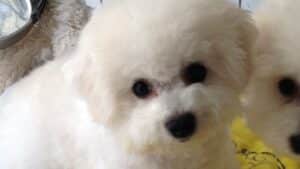
The Bichon Frise
Understanding the unique qualities and judging standards of Bichon Frises, from balance and proportions to head structure and coat texture.
Home » Dog Breeds » Bichon Frise Dog Breed
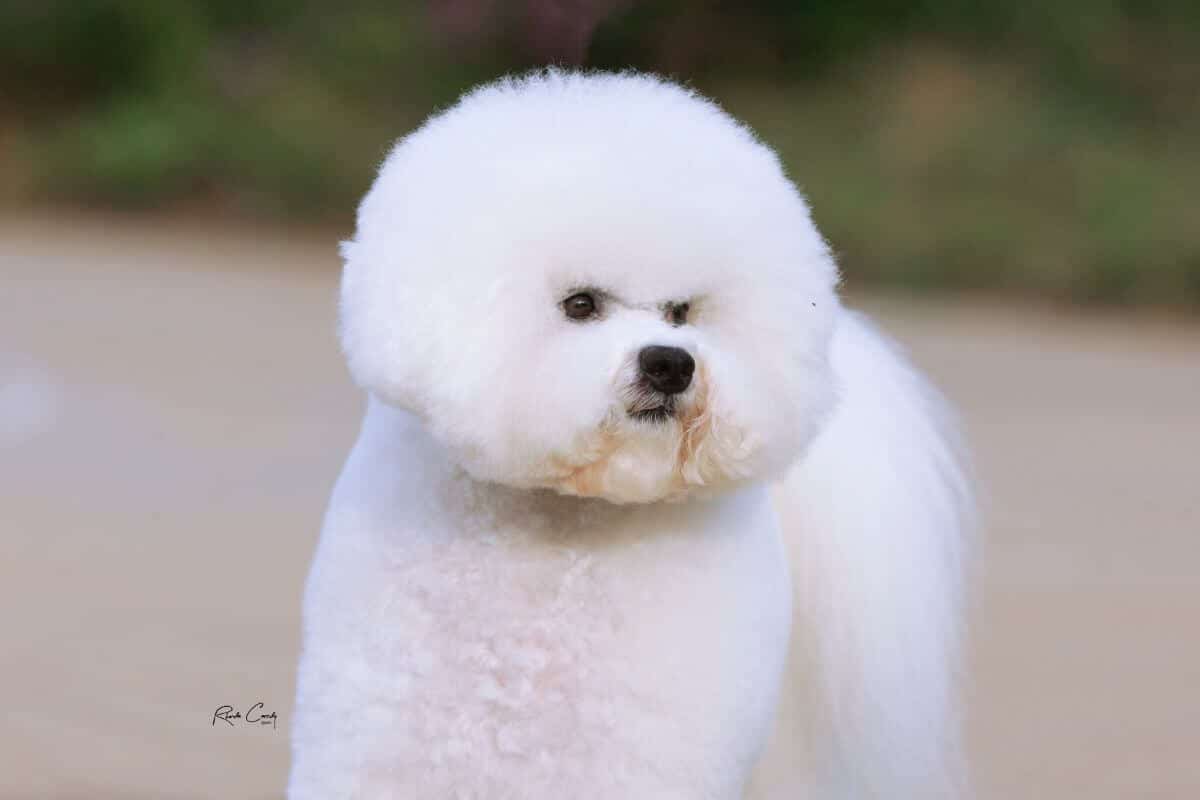
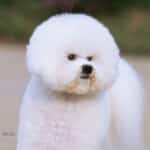
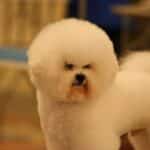
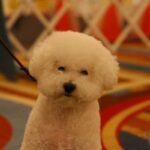
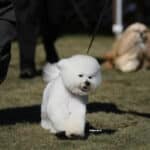
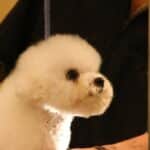
The Bichon Frise is a charming, affectionate, and cheerful breed, renowned for its distinctive fluffy coat and playful demeanor. These small dogs possess an air of elegance and confidence, which combined with their friendly nature, makes them a beloved companion in many households around the world. Their convenient size and adaptive qualities also render them well-suited for a variety of activities and dog sports.
Non-Sporting
9.5 – 11.5 inches
12 – 18 pounds
14 – 15 years
| Country of Origin | Spain (Canary Islands) |
|---|---|
| Bred For | Companionship |
| Known For | Affection, Inquisitive Expression, Powder Puff Appearance |
| Popularity | Moderate |
| Temperament | Affectionate, Playful, Sensitive |
| Activities | Walking, Playing, Conformation Shows, Dog Sports |
The Bichon Frise dog breed has a rich history that spans several centuries and continents. Originally developed in the Mediterranean region, these dogs are believed to have descended from water spaniels and were known by several names like the Barbichon, which was later shortened to Bichon. The breed was particularly favored by Italian nobility in the 1300s and was brought into France during the Renaissance under the patronage of King Francis I.
Their popularity soared in the French royal courts in the 16th century, especially under the reign of King Henry III, who was particularly fond of the breed. The Bichon Frise was not just a lapdog for the aristocracy; they also found a place among the common folk, performing as circus dogs due to their trainable nature and delightful antics.
However, by the late 19th century, the breed’s popularity waned, and they were seen more on the streets than in the palaces, often accompanying street musicians or performing in fairs. This period, although a decline in their royal status, showcased their adaptability and resilience.
The breed’s fortunes revived in the 20th century, especially post World War I, with efforts to define and preserve the breed standard. The official recognition of the Bichon Frise by the Fédération Cynologique Internationale (FCI) occurred in the 1930s, with France being acknowledged as the breed’s country of patronage.
The Bichon Frise was introduced to the United States in the 1950s, and its endearing qualities quickly garnered a dedicated following. The American Kennel Club (AKC) granted recognition to the breed in 1972. Since then, the Bichon Frise has become a beloved pet in many American homes, known for its playful disposition and characteristic fluffy white coat. Their history, marked by rises and falls, reflects a breed adaptable to various roles, from royal companion to a beloved family pet.
The adult Bichon Frise typically stands between 9.5 and 11.5 inches tall at the shoulder. In terms of weight, a Bichon Frise generally weighs between 12 and 18 pounds, embodying a sturdy build that belies its rather delicate appearance.
The Bichon Frise is characterized by a compact, well-proportioned body that is slightly longer than it is tall. The length of the body from the forward-most point of the chest to the point of the rump extends one-quarter longer than the height at the withers, emphasizing its well-balanced structure.
The breed exhibits moderate bone, which provides a sturdy yet elegant foundation that is without exaggeration. The overall impression is one of balance and refinement, with a distinctive silhouette.
Texture: The Bichon Frise boasts a unique coat that significantly contributes to its charming appearance. The outer coat is curly and springy, standing off the body and giving a puffy look. It’s paired with a soft, dense undercoat, which only adds to the plushness. This combination of textures is essential for the breed’s distinctive, powder-puff appearance.
| Standard Color | |
|---|---|
| White | ee |
| White & Apricot | ee |
| White & Buff | ee |
| White & Cream | ee |
A Note About Color: The Bichon Frise is essentially a white dog, but shadings of apricot, buff or cream may appear on the body and especially around the ears. An adult coat with more than 10 percent colored shading, however, is undesirable.
The natural tail of the Bichon Frise is a prominent feature that adds a flourish to the breed’s cheerful appearance. It is set on level with the topline and carried over the back, reaching midway to the withers. It is well plumbed with hair that rests casually on the back. A low tail set, drooping tail, or corkscrew tail is not acceptable in the breed. A correctly carried, plumed tail is unmistakable and is indicative of the breed’s lively, happy nature.
Owning a Bichon Frise can be a highly rewarding experience, characterized by the breed’s cheerful disposition and affectionate nature. These dogs are known for their playful personalities and strong bond with family members, making them excellent companions. However, potential Bichon Frise owners should be aware of the breed’s specific needs, including grooming requirements, exercise, and social interaction, to make sure that they provide a nurturing environment for their pet.
Bichon Frises are generally healthy dogs, but they do have certain breed-specific health concerns that owners should be mindful of. Their fluffy coats require regular grooming to prevent matting and skin issues. Also, due to their small size, they may be prone to dental problems and should have regular dental check-ups.
The average lifespan of a Bichon Frise is about 14 to 15 years. They tend to live a relatively long and healthy life when they receive proper care and attention. Preventive healthcare, including regular veterinary visits, vaccinations, and maintaining a healthy diet and exercise routine, is crucial for their long-term well-being.
The Bichon Frise, like any breed, has specific health concerns. Prospective and current owners should be aware of these, especially in relation to the recommended health evaluations for the breed:
Awareness and proactive care for these potential health issues can help them to live a long, healthy life. Regular check-ups and adherence to health evaluation recommendations play a crucial role in early detection and management of these conditions.
Understanding the personality of the Bichon Frise is crucial for anyone considering this breed. These dogs are typically known for their affectionate, cheerful disposition, making them excellent companions. Bichon Frise’s gentle and amiable nature often makes them a good fit for novice dog handlers. However, their sensitivity means they can react to their environment and the moods of their human companions, requiring a positive, nurturing household.
They generally cope well with being left alone for short periods, but like all dogs, they thrive on companionship and may become anxious if left alone for too long. Their friendly demeanor extends not only to their family but also to other dogs and strangers, often greeting people with enthusiastic affection.
Their interaction with young children is usually positive, making them a suitable choice for families. However, as with any breed, interactions with young children should be supervised to guarantee the safety and comfort of both the dog and the child. Despite their small size, Bichons are generally alert and may occasionally bark to alert their family to visitors or unusual noises, though they are not known as excessive barkers.
Their overall sociable and gentle temperament makes the Bichon Frise an enjoyable and loving addition to many households, bringing joy and liveliness to their human companions
Feeding a Bichon Frise requires careful consideration to make sure that they receive a balanced diet that supports their health and energy levels. Puppies of this breed, with their rapid growth and high energy, often need nutrient-rich food that’s formulated specifically for small-breed puppies. This provides them with the correct balance of proteins, fats, carbohydrates, vitamins, and minerals essential for their development.
Transitioning to adult food typically occurs around the age of one year. The amount of food a Bichon Frise requires can vary based on age, activity level, and metabolism. An average adult Bichon Frise may need between 1/2 to 1 1/4 cups of high-quality dry food a day, divided into two meals. However, this can differ from dog to dog, and it’s always best to consult with a veterinarian to determine the optimal feeding schedule and amount.
It’s important to monitor their weight, as they can be prone to obesity if overfed. Treats should be given in moderation, and fresh water should always be available. Additionally, Bichon Frises, like many small breeds, can be picky eaters, so finding a nutritious and appealing diet may require some experimentation. Regularly scheduled meals, rather than free feeding, can help maintain their weight and health over time.
Training a Bichon Frise can be a delightful experience due to their intelligent and eager-to-please nature. These dogs respond well to positive reinforcement techniques, such as praise, play, and treats. Starting training early is key, as it helps in shaping a well-behaved and sociable dog. Bichon Frises are known for their quick learning ability, but consistency is crucial to reinforce good behaviors and discourage undesirable ones.
While they are smart, Bichon Frises can sometimes be stubborn, so patience and persistence are important. They excel in obedience training and can be taught a variety of commands and tricks. This breed also enjoys interactive play, which can be a fun and effective part of the training process.
Socialization is another critical aspect of training for a Bichon Frise. Exposing them to different people, environments, sounds, and experiences at a young age helps in developing a well-rounded and confident adult dog. Given their friendly disposition, they usually adapt well to new situations and people, making them ideal for families and active individuals. Regular training sessions not only stimulate their mind but also strengthen the bond between the dog and their human companion.
The exercise needs of the Bichon Frise are moderate, making them well-suited for a variety of living situations, including apartments. Regular exercise is vital to keep them healthy, both physically and mentally. Daily walks, play sessions, and interactive games are excellent ways to meet their activity requirements. Despite their small size, Bichon Frises possess a playful and lively nature, enjoying activities that engage them both mentally and physically.
| Energy Level | Moderate to High |
|---|---|
| Exercise Requirements | 30 Minutes/Day (Minimum), Daily Walks, Vigorous Running, Regular Exercise, Playing with Another Dog, Mental Stimulation |
Their energy level is moderately high, but they are usually not overly intense. This makes them adaptable to the lifestyles of their human companions, whether it involves relaxed indoor activities or more energetic outdoor adventures. Playfulness is a significant trait of the Bichon Frise, and they often maintain a puppy-like demeanor well into their adult years.
Incorporating exercise into their daily routine not only keeps them fit but also helps in preventing boredom and related behavioral issues. A Bichon Frise left without adequate physical and mental stimulation can develop destructive behaviors as an outlet for their energy. However, their exercise needs can be easily met with a balance of indoor play and outdoor activities, ensuring they lead a happy and healthy life.
Grooming a Bichon Frise is an important aspect of their care, due to their distinctive, curly coat. Regular grooming is essential to keep their fur in good condition and to prevent mats and tangles. Their coat requires frequent brushing, ideally several times a week, to maintain its fluffy appearance and to ensure their comfort and health.
| Coat Type | Double, Curly, Coarse, Long |
|---|---|
| Grooming Requirements | Weekly Brushing, Monthly Trimming, Occasional Bathing, Routine Ear Cleaning, Periodic Nail Trimming, Regular Tooth Brushing |
While Bichons are known for being a low-shedding breed, their curly hair can trap loose fur, necessitating regular grooming to remove it. This characteristic makes them a popular choice for individuals with allergies, as they tend to release less hair and dander into the environment compared to many other breeds. However, it’s important to note that no breed is completely hypoallergenic.
Professional grooming every 4 to 6 weeks is often recommended to keep their coat trimmed and neat. This regular maintenance not only keeps the Bichon looking their best but also helps in preventing skin issues that can arise from an unkempt coat.
Ear cleaning, nail trimming, and dental care are also important parts of the grooming routine for a Bichon Frise, contributing to their overall health and well-being.
Living with a Bichon Frise can be a delightful experience, adaptable to various lifestyles and environments. These dogs are known for their adaptable nature, making them suitable for both apartment living and homes with larger spaces. However, their energy levels and need for regular interaction should not be underestimated, regardless of the living space size.
In terms of climate adaptability, Bichon Frises generally do well in most climates. Their dense coat provides them with a fair amount of protection against colder temperatures. Nonetheless, they are primarily indoor dogs and should not be left outside for extended periods in extreme weather conditions. During hot weather, it’s important to make sure that they stay cool and hydrated, as their thick coat can make them prone to overheating.
Their small size and generally quiet nature make them a good fit for apartment living. They are less likely to be disruptive to neighbors, given their moderate barking tendency. However, their social nature means they thrive on human interaction and can suffer from separation anxiety if left alone for prolonged periods.
In a family setting, Bichons are a joyous addition. Their playful and affectionate demeanor makes them excellent companions for children, though interactions should always be supervised, especially with younger children. They typically get along well with other pets in the household, including cats, if properly introduced and socialized from a young age.
Overall, Bichon Frises are flexible and charming companions, fitting into various lifestyles with ease. Their primary requirements are regular grooming, sufficient daily exercise, and, most importantly, ample love and attention from their human families. Whether in a bustling city apartment or a spacious suburban home, a Bichon Frise can bring joy and liveliness to its environment.
Raising a Bichon Frise puppy offers a blend of joy and responsibility. These puppies, with their fluffy coats and endearing personalities, quickly become beloved members of their families. It’s important for future handlers to understand the unique needs of Bichon Frise puppies as they grow and develop. Their early months are critical for setting the foundation for a healthy, happy adult dog.
Caring for a Bichon Frise puppy involves several important aspects. Initially, providing a safe and nurturing environment is crucial for their physical and emotional development. Puppies of this breed are energetic and curious, necessitating close supervision and a safe play area. When it comes to nutrition, a diet specifically formulated for small-breed puppies will provide the necessary nutrients for growth.
Early socialization and training are paramount. Exposing Bichon Frise puppies to a variety of people, sounds, and experiences helps in developing a well-rounded temperament. Positive reinforcement training methods work best, focusing on consistency and patience. Regular veterinary check-ups are vital during this stage to monitor their health and administer necessary vaccinations.
Finally, as with any breed, Bichon Frise puppies require love, attention, and plenty of interactive playtime. Engaging with them through play and training not only strengthens the bond with their human companions but also aids in their overall development and well-being.
The Bichon Frise is not only a charming companion but also an enthusiastic participant in various dog sports and activities. Their intelligence and eagerness to please make them well-suited for these engaging pursuits:
Participation in these activities fosters a deeper connection between the Bichon Frise and their handlers, while also providing valuable mental and physical stimulation for the dog.
The Bichon Frise is recognized by the world’s leading registries and kennel organizations, which categorize the breed into a specific Group based on its unique characteristics. This breed is recognized worldwide under the following Group designations:
| Organization | Group Designation |
|---|---|
| AKC (American Kennel Club) | Non-Sporting |
| UKC (United Kennel Club) | Companion |
| CKC (Canadian Kennel Club) | Non-Sporting |
| ANKC (Australian National Kennel Council) | Toys |
| RKC (The Royal Kennel Club) | Toy |
| FCI (Fédération Cynologique Internationale) | Group 9: Companion and Toy Dogs; Section 1: Bichons and Related Breeds |
The ideal Bichon Frise is described by a Breed Standard that is approved by each of the world’s leading registries and kennel organizations. The Breed Standards for this breed may be found in the following links:
| Organization | Breed Standard |
|---|---|
| American Kennel Club | AKC Bichon Frise Breed Standard |
| United Kennel Club | UKC Bichon Frise Breed Standard |
| Canadian Kennel Club | CKC Bichon Frise Breed Standard |
| Australian National Kennel Council | ANKC Bichon Frise Breed Standard |
| The Royal Kennel Club | RKC Bichon Frise Breed Standard |
| Fédération Cynologique Internationale | FCI Bichon Frise Breed Standard |
The Bichon Frise enjoys a strong and supportive community across various countries, with numerous clubs dedicated to the welfare and betterment of the breed. These clubs play a crucial role in preserving breed standards, promoting responsible breeding practices, and providing educational resources for both enthusiasts and prospective owners.
In the United States, the Bichon Frise Club of America, Inc., founded in 1964, stands as a testament to the breed’s enduring popularity and serves as a resource for breeders, handlers, and enthusiasts alike. It provides a platform for sharing information, organizing events, and fostering a community of Bichon Frise lovers.
Canada is home to the Bichon Frise Club of Canada, a national club that provides a platform for Canadian enthusiasts to share their passion for the breed. The club focuses on the health and well-being of Bichons in Canada, offering support and information to owners and breeders alike.
In the United Kingdom, the Bichon Frise Club of Great Britain, established in 1976, plays a similar role. It offers guidance and support to Bichon Frise owners and breeders in the UK and works to maintain the breed standards and health.
Despite the best efforts of breeders and owners, there are instances where Bichon Frises may find themselves in need of assistance. Rescue groups are indispensable in such situations, providing crucial services in the rescue, rehabilitation, and rehoming of Bichon Frises who have faced abandonment, neglect, or require a new home due to unforeseen circumstances.
In the USA, notable organizations include the Bichon Frise Club of America Charitable Trust, which offers support and resources for the rescue and welfare of Bichon Frises nationwide. Regionally, the Bichon Rescue Brigade, based in Southern California, and the Bichon Frise Rescue of Northern New Jersey, provide rescue services, fostering, and adoption opportunities specific to those areas.
In the UK, Bichon Frise Rescue is a prominent organization dedicated to the breed. They work tirelessly to rescue, rehabilitate, and rehome Bichon Frises, ensuring that these dogs receive the care and love they need before finding their forever homes.
In addition to these dedicated Bichon Frise rescue groups, local shelters and general animal rescue organizations can sometimes have Bichon Frises and mixed breeds available for adoption. These local shelters play a crucial role in providing temporary care and seeking out new homes for Bichon Frises.
Bichon Frises typically have a long lifespan but are prone to certain health conditions that can be life-limiting. Common causes of death in older Bichon Frises include cancer, heart disease, and kidney problems. Regular veterinary check-ups and a healthy lifestyle can help in early detection and management of these conditions, potentially extending their lifespan.
Bichon Frises are known for their low-shedding coat, making them a popular choice for individuals with allergies. Their curly, puffy coat traps loose hairs, minimizing the amount of hair they release into the environment. Regular grooming is essential to prevent matting and to maintain their distinctive fluffy appearance.
While no dog breed is entirely hypoallergenic, Bichon Frises are often recommended for allergy sufferers due to their low shedding. Their unique coat produces less dander, a common allergen found in dog fur. However, individual allergies vary, so spending time with a Bichon Frise before adopting is advisable.
Bichon Frises are a small breed, with adults typically weighing 12 to 18 pounds and standing about 9.5 to 11.5 inches at the shoulder. Despite their small size, they have a sturdy and well-proportioned build. Their compact size makes them suitable for both apartment living and houses.
Bichon Frises generally have a long lifespan, often living between 14 to 15 years, with some reaching 17 years or more. Proper care, regular veterinary check-ups, and a healthy lifestyle significantly contribute to their longevity. Their cheerful and playful disposition often remains well into their senior years.
A Bichon Frise typically reaches its full size by the age of 12 months, although they may continue to fill out and gain muscle until they are about 18 months old. Their emotional and mental maturity develops over time, often reaching full maturity around 2 years of age.
Bichon Frises are known for their intelligence and eagerness to please, making them highly trainable. They excel in obedience training and can learn a variety of tricks and commands. Their smart and attentive nature also makes them great therapy and companion dogs.
Bichon Frises can be vocal, often barking to alert their owners of visitors or unusual noises. However, with proper training and socialization, excessive barking can be managed. They are not known for being unnecessarily noisy and can learn to be quiet with consistent training.
Bichon Frises are generally easy to train due to their intelligence and desire to please their owners. They respond well to positive reinforcement and consistent training methods. Early socialization and obedience training are recommended to bring out the best in their temperament.
Bichon Frises are an excellent choice for first-time dog owners due to their manageable size, friendly temperament, and trainability. They are adaptable, get along well with families, and their grooming needs, while regular, are a good way for new owners to learn about responsible dog care.
Bichon Frises are generally not aggressive and are known for their gentle and affectionate nature. They are friendly and sociable, making them great companions. Like any breed, individual temperament can vary, so early socialization and training are important to encourage good behavior.
Bichon Frises are social animals that thrive on human companionship and can struggle with being left alone for extended periods. They can develop separation anxiety, which may lead to destructive behavior. It’s not advisable to leave them alone all day; arranging for a dog walker or pet sitter can help if you have long workdays.
Bichon Frises, with their friendly and playful nature, can get along well with cats, especially if they are raised together or properly introduced. Their gentle demeanor makes them less likely to chase or harass a cat. As with any introduction between pets, it should be done gradually and under supervision.
Bichon Frises generally get along well with other dogs. Their sociable and playful nature makes them great companions for other friendly dogs. Proper socialization from a young age is key to helping Bichon Frises become comfortable and well-behaved around other dogs.

Understanding the unique qualities and judging standards of Bichon Frises, from balance and proportions to head structure and coat texture.

Dr. Elanie Rude is the breeder behind Lemerle Bichons Fries & Standard Poodles. Read about the kennel’s beginnings, puppies, and much more!
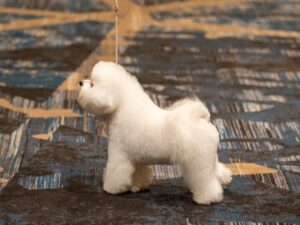
Summary of the Bichon Frise Breed Standard, detailing its grooming, movement & temperament. Learn about the breed’s key characteristics.
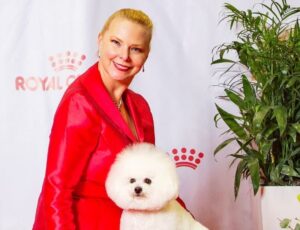
Wendy Whittle is the breeder behind the Calvada Bichon Frise. Read about the kennel’s beginnings, champions, dogs, puppies, and more!
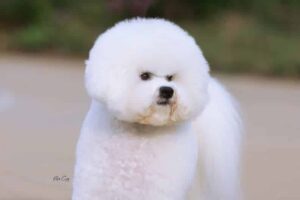
Judging the Bichon Frise – As you stand in the ring with your judges book and pen in hand, and check off each armband, you find it is a bit
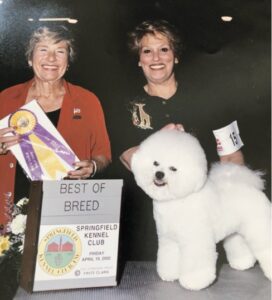
Mimi Winkler | Judges Choice Bichons Frises: Interview about her interested in breeding and showing purebred dogs.

Understanding the unique qualities and judging standards of Bichon Frises, from balance and proportions to head structure and coat texture.

Dr. Elanie Rude is the breeder behind Lemerle Bichons Fries & Standard Poodles. Read about the kennel’s beginnings, puppies, and much more!

Summary of the Bichon Frise Breed Standard, detailing its grooming, movement & temperament. Learn about the breed’s key characteristics.

Wendy Whittle is the breeder behind the Calvada Bichon Frise. Read about the kennel’s beginnings, champions, dogs, puppies, and more!

Judging the Bichon Frise – As you stand in the ring with your judges book and pen in hand, and check off each armband, you find it is a bit

Mimi Winkler | Judges Choice Bichons Frises: Interview about her interested in breeding and showing purebred dogs.
The best way to ensure a long and happy relationship with a purebred dog is to purchase one from a responsible breeder. Not sure where to begin?
Contact the National Parent Club’s Breeder Referral Program, which is listed on the AKC Breeder Referral Contacts page.
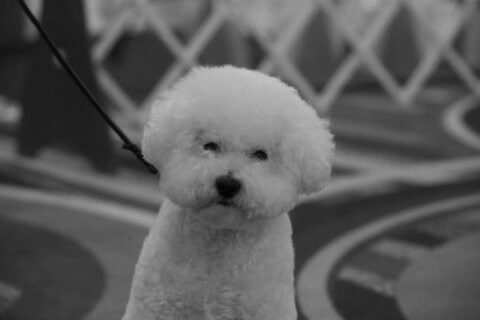

"*" indicates required fields
Showsight Magazine–the world’s most influential purebred dog publication since 1992. Each issue reaches a global audience dedicated to preserving the history and health of purpose bred dogs. Filled with award-winning editorial focused on news and insights from the dog show community, top breeders, handlers, AKC Judges, and more!